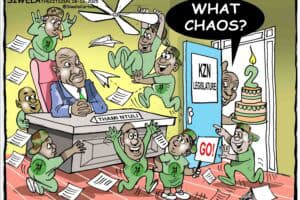Critics, however, say most African politicians have used Twitter as a means of churning out propaganda without listening to citizens’ concerns.

When South Africa’s former president Jacob Zuma, a proud traditionalist, joined Twitter recently, it was a vivid signal that politicians on the continent are slowly but surely waking up to the power of social media in modern-day political discourse.
The response has been mixed.
Some African politicians, like Zuma, have appeared to drag themselves into the 21st century to finally embrace platforms like Twitter, Facebook and Instagram as a way of wooing millions of citizens, including millennials often unhappy with their governance.
But several governments have lashed out at what they often see as the use of social media by opponents to sow dissent, and have taken punitive measures.
In a homemade video marking his Twitter debut in mid-December, Zuma, who is usually more in his element addressing his largely rural support base at rallies, said he had decided to “to move with the times”.
“I felt it is necessary that I should join in and be part of the conversation and join the people in their discussions,” the 76-year-old, who has denied charges of corruption, said.
Within a few hours of the post, Zuma’s Twitter followers swelled from a few hundred to tens of thousands. Less than a month and nearly 30 tweets later, he now boasts 150,000 followers, both admirers and detractors.
Many would argue that his belated venture into social networking is pointless because he was booted out as South Africa’s president nearly a year ago and now appears to have limited political clout.
But Zuma (@PresJGZuma) joins a growing number of African politicians realising that they can no longer dismiss those who have tended to be apathetic in the past, particularly at elections, but who now are becoming increasingly engaged and keen to voice their discontent online.
Kenyan President Uhuru Kenyatta (@UKenyatta) is sub-Saharan Africa’s most followed leader with nearly 3.5 million followers, trailed by Nigeria’s Muhammadu Buhari (@MBuhari), with 1.8 million, and Rwandan leader Paul Kagame (@PaulKagame) with 1.3 million.
Zuma could soon outpace his successor Cyril Ramaphosa (@CyrilRamaphosa), who joined the platform in 2015 but still boasts a modest 385,000 followers, while Zimbabwe’s Emmerson Mnangagwa (@edmnangagwa) joined in late 2011 but commands a 288,000 following.
To be fair, Mnangagwa has only become prolific on the platform after taking over from veteran leader Robert Mugabe who was forced by the military to step down in November 2017.
Mnangagwa probably felt it prudent to keep up with his main opponent Nelson Chamisa of the Movement for Democratic Change (MDC) who, at just 40, is very much at home on social media.
Critics, however, say the majority of African politicians, much like international counterparts including America’s Donald Trump, have used Twitter as a one-way means of churning out propaganda without listening to citizens’ concerns.
More disturbingly, several governments have shown an intolerance for a medium they see as a tool of political enemies.
This week, outgoing Democratic Republic of Congo President Joseph Kabila’s government shut down the internet to curb what it called attempts by the opposition to post “fictitious results” after chaotic weekend elections that are likely to be disputed.
Preliminary results from the December 30 vote are expected within a week, but the final tally will be announced on January 15, suggesting the internet shutdown could last another fortnight.
Sudanese activists say authorities are blocking access to popular social media platforms used to coordinate nationwide anti-government protests aimed at forcing out President Omar al-Bashir, in power since 1989.
Reports say this has affected about 13 million internet users in the northeast African country of 40 million.
On December 24, Amnesty International said it had credible reports that 37 protesters had been shot dead by security forces in five days of anti-government demonstrations.
“Instead of trying to stop people from demonstrating, the authorities should be focusing on ending longstanding repression of human rights and resolving the economic crisis that have collectively precipitated these protests,” it urged.
In Zimbabwe, officials from Mnangagwa’s governing ZANU-PF party, which Chamisa’s MDC Alliance accuses of rigging elections last July to extend its nearly 39-year grip on power, have hinted at a crackdown against citizens, many living in the diaspora, whom they accuse of using social media to “peddle lies bent on causing mayhem and anarchy.”
The government has hinted at new laws to control the use of social media, although it’s unclear how it would apply these against non-residents.
South African editors say the radical opposition Economic Freedom Fighters is using social media to issue veiled threats against journalists who have written stories alleging graft against some of its leaders.
The EFF says mainstream media has taken a position against the party in retaliation over its push to nationalise commercial farms, mines, and banks to even out inequalities in the country.
The South African National Editors Forum last month lodged a complaint in the Equality Court against the party, accusing it of failing to stop supporters from launching online attacks, particularly against female journalists.
“Calls have been made by EFF supporters for the killing of certain journalists,” it said. “The EFF leadership’s silence on this barrage of hatred has been deafening.”
– African News Agency (ANA)
- Stella Mapenzauswa is a Johannesburg-based journalist, media consultant, and trainer who has covered economics and politics in southern Africa, including Zimbabwe, South Africa, Zambia, Mozambique, Angola, Namibia, Botswana, and Malawi, for more than two decades.
For more news your way, download The Citizen’s app for iOS and Android.






